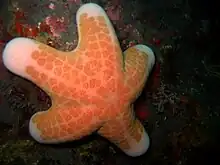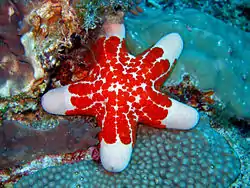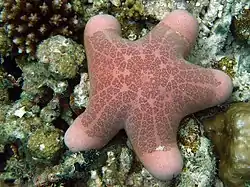Choriaster
Choriaster is monotypic genus in the family Oreasteridae containing the single species Choriaster granulatus commonly known as the granulated sea star. Other common names include big-plated sea star and doughboy starfish.[2] This species is harmless to humans.
| Choriaster | |
|---|---|
 | |
| Choriaster granulatus in Occidental Mindoro, Philippines | |
| Scientific classification | |
| Kingdom: | |
| Phylum: | |
| Class: | |
| Order: | |
| Family: | |
| Genus: | Choriaster |
| Species: | C. granulatus |
| Binomial name | |
| Choriaster granulatus Lütken, 1869 | |
Description
the Choriaster granulatus is a large sea star with a convex body and five short arms. The arms have rounded tips, making it appear "chubby", leading to one of its common names being "the doughboy starfish". Relatively large in comparison with other sea stars, its maximum radius is about 27 centimetres (11 in). It is most commonly pale pink in colour with brown papillae radiating out from the centre but can also be colours ranging from grey to yellow and even red.[3] [4]
Location
This species is found in numerous tropical waters, including:[5]
Habitat

Choriaster granulatus prefers shallow waters ranging from 1.5 to 53 metres (5 to 174 ft) deep and above average temperatures of 24 to 29 °C (75 to 84 °F).[7] Choriaster granulatus has been found individually or in groups along coral reefs in the Indo-West Pacific region.[8] It has also been found in the Red Sea, Fiji, and Great Barrier Reef.[9] The sandy habitat where it tends to live is characterized by rubble slopes and detritus. They have also been found among corals and sponges.[10]

Diet
Choriaster granulatus is a carnivore that, like other sea stars, has its mouth on the underside of its body. Food is digested and absorbed outside of its body by forcing its stomach out of its mouth onto the food.[11] Its food includes small invertebrates such as coral polyps as well as carrion.[12]
Life cycle and reproduction
Sea star embryos hatch into planktonic larvae before becoming juvenile sea stars with five arms. The Asteroidea class of organisms reproduce use both asexually and sexually.[13]
Threats
The arms of Choriaster granulatus can become deformed when small parasitic limpets attach to their underside.[14] They are also threatened by habitat loss due to ocean acidification which can lead to coral bleaching. [15]
References
- C.L. Mah (2010). "Asteroidea taxon details for Choriaster Lütken, 1869". World Asteroidea Database. Retrieved June 29, 2011.
- "The Granulated Sea Star – Whats That Fish!". www.whatsthatfish.com. Retrieved 2018-03-19.
- "Taxonomic". domainsoflife.yolasite.com. Retrieved 2018-03-19.
- Antokhina, Tatiana I.; Britayev, Temir A. (2020). "Host recognition behaviour and its specificity in pontoniine shrimp Zenopontonia soror (Nobili, 1904) (Decapoda: Caridea: Palaemonidae) associated with shallow-water sea stars". Journal of Experimental Marine Biology and Ecology. 524: 151302. doi:10.1016/j.jembe.2019.151302. S2CID 213212469.
- "Marine Fish Picture Gallery – Granulated Seastar picture". Archived from the original on 2021-12-27. Retrieved 2011-02-19.
- Choriaster granulatus, granular sea star
- "Granulated Sea Star – Choriaster granulatus – Details – Encyclopedia of Life". Encyclopedia of Life. Retrieved 2018-03-19.
- "Taxonomic". domainsoflife.yolasite.com. Retrieved 2018-03-19.
- "Taxonomic". domainsoflife.yolasite.com. Retrieved 2018-03-19.
- "Choriaster granulatus, granular sea star". www.sealifebase.org. Retrieved 2018-03-19.
- "The Granulated Sea Star – Whats That Fish!". www.whatsthatfish.com. Retrieved 2018-03-19.
- "Choriaster granulatus, granular sea star". www.sealifebase.org. Retrieved 2018-03-19.
- "Choriaster granulatus, granular sea star". www.sealifebase.org. Retrieved 2018-03-19.
- "The Granulated Sea Star – Whats That Fish!". www.whatsthatfish.com. Retrieved 2018-03-19.
- Pendleton, Linwood; Hoegh-Guldberg, Ove; Albright, Rebecca; Kaup, Anne; Marshall, Paul; Marshall, Nadine; Fletcher, Steve; Haraldsson, Gunnar; Hansson, Lina (2019). "The Great Barrier Reef: Vulnerabilities and solutions in the face of ocean acidification". Regional Studies in Marine Science. 31: 100729. doi:10.1016/j.rsma.2019.100729. S2CID 199095368.
External links
- Photos of Choriaster on Sealife Collection